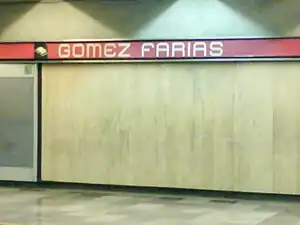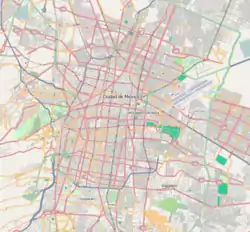Gómez Farías metro station
Gómez Farías metro station[lower-alpha 1] is a station of the Mexico City Metro in Venustiano Carranza, Mexico City. It is an underground station with two side platforms served by Line 1 (the Pink Line) between Boulevard Puerto Aéreo and Zaragoza stations. It serves the colonias (neighborhoods) of Federal and Gómez Farías; the station receives its name from the latter, which in turn is named after Valentín Gómez Farías, the seventh president of Mexico (he served intermittently from 1833 to 1847). The pictogram depicts a representation of the Mexican Constitution of 1857, which was promoted by Gómez Farías during his tenure as the president of Congress. Gómez Farías metro station opened on 4 September 1969 with service westward toward Chapultepec station and eastward toward Zaragoza station. The facilities are partially accessible to people with disabilities as it has escalators. In 2019, the station had an average daily ridership of 28,385 passengers, making it the 48th busiest station in the network and the 11th busiest of the line. Since 11 July 2022, the station has remained closed due to modernization works on the tunnel and the line's technical equipment.[2]
| STC rapid transit | |||||||||||||||||||||||||||||||||||||||||||||||||||||||||||||||||||||||||||||||||||||||||||||||||||||||||||||||||||||||||||||||||||||||||||||||||||||||||||||||||||||||||
 Station platform, 2009 | |||||||||||||||||||||||||||||||||||||||||||||||||||||||||||||||||||||||||||||||||||||||||||||||||||||||||||||||||||||||||||||||||||||||||||||||||||||||||||||||||||||||||
| General information | |||||||||||||||||||||||||||||||||||||||||||||||||||||||||||||||||||||||||||||||||||||||||||||||||||||||||||||||||||||||||||||||||||||||||||||||||||||||||||||||||||||||||
| Location | Calzada Ignacio Zaragoza Venustiano Carranza, Mexico City Mexico | ||||||||||||||||||||||||||||||||||||||||||||||||||||||||||||||||||||||||||||||||||||||||||||||||||||||||||||||||||||||||||||||||||||||||||||||||||||||||||||||||||||||||
| Coordinates | 19.416472°N 99.09035°W | ||||||||||||||||||||||||||||||||||||||||||||||||||||||||||||||||||||||||||||||||||||||||||||||||||||||||||||||||||||||||||||||||||||||||||||||||||||||||||||||||||||||||
| Owned by | Government of Mexico City | ||||||||||||||||||||||||||||||||||||||||||||||||||||||||||||||||||||||||||||||||||||||||||||||||||||||||||||||||||||||||||||||||||||||||||||||||||||||||||||||||||||||||
| Operated by | Sistema de Transporte Colectivo (STC) | ||||||||||||||||||||||||||||||||||||||||||||||||||||||||||||||||||||||||||||||||||||||||||||||||||||||||||||||||||||||||||||||||||||||||||||||||||||||||||||||||||||||||
| Line(s) | |||||||||||||||||||||||||||||||||||||||||||||||||||||||||||||||||||||||||||||||||||||||||||||||||||||||||||||||||||||||||||||||||||||||||||||||||||||||||||||||||||||||||
| Platforms | 2 side platforms | ||||||||||||||||||||||||||||||||||||||||||||||||||||||||||||||||||||||||||||||||||||||||||||||||||||||||||||||||||||||||||||||||||||||||||||||||||||||||||||||||||||||||
| Tracks | 2 | ||||||||||||||||||||||||||||||||||||||||||||||||||||||||||||||||||||||||||||||||||||||||||||||||||||||||||||||||||||||||||||||||||||||||||||||||||||||||||||||||||||||||
| Connections | |||||||||||||||||||||||||||||||||||||||||||||||||||||||||||||||||||||||||||||||||||||||||||||||||||||||||||||||||||||||||||||||||||||||||||||||||||||||||||||||||||||||||
| Construction | |||||||||||||||||||||||||||||||||||||||||||||||||||||||||||||||||||||||||||||||||||||||||||||||||||||||||||||||||||||||||||||||||||||||||||||||||||||||||||||||||||||||||
| Structure type | Underground | ||||||||||||||||||||||||||||||||||||||||||||||||||||||||||||||||||||||||||||||||||||||||||||||||||||||||||||||||||||||||||||||||||||||||||||||||||||||||||||||||||||||||
| Accessible | Partial | ||||||||||||||||||||||||||||||||||||||||||||||||||||||||||||||||||||||||||||||||||||||||||||||||||||||||||||||||||||||||||||||||||||||||||||||||||||||||||||||||||||||||
| Other information | |||||||||||||||||||||||||||||||||||||||||||||||||||||||||||||||||||||||||||||||||||||||||||||||||||||||||||||||||||||||||||||||||||||||||||||||||||||||||||||||||||||||||
| Status | Out of service | ||||||||||||||||||||||||||||||||||||||||||||||||||||||||||||||||||||||||||||||||||||||||||||||||||||||||||||||||||||||||||||||||||||||||||||||||||||||||||||||||||||||||
| History | |||||||||||||||||||||||||||||||||||||||||||||||||||||||||||||||||||||||||||||||||||||||||||||||||||||||||||||||||||||||||||||||||||||||||||||||||||||||||||||||||||||||||
| Opened | 4 September 1969 | ||||||||||||||||||||||||||||||||||||||||||||||||||||||||||||||||||||||||||||||||||||||||||||||||||||||||||||||||||||||||||||||||||||||||||||||||||||||||||||||||||||||||
| Key dates | |||||||||||||||||||||||||||||||||||||||||||||||||||||||||||||||||||||||||||||||||||||||||||||||||||||||||||||||||||||||||||||||||||||||||||||||||||||||||||||||||||||||||
| 11 July 2022 | Temporarily closed | ||||||||||||||||||||||||||||||||||||||||||||||||||||||||||||||||||||||||||||||||||||||||||||||||||||||||||||||||||||||||||||||||||||||||||||||||||||||||||||||||||||||||
| Passengers | |||||||||||||||||||||||||||||||||||||||||||||||||||||||||||||||||||||||||||||||||||||||||||||||||||||||||||||||||||||||||||||||||||||||||||||||||||||||||||||||||||||||||
| 2022 | 7,337,725[1] | ||||||||||||||||||||||||||||||||||||||||||||||||||||||||||||||||||||||||||||||||||||||||||||||||||||||||||||||||||||||||||||||||||||||||||||||||||||||||||||||||||||||||
| Rank | 94/195[1] | ||||||||||||||||||||||||||||||||||||||||||||||||||||||||||||||||||||||||||||||||||||||||||||||||||||||||||||||||||||||||||||||||||||||||||||||||||||||||||||||||||||||||
| Services | |||||||||||||||||||||||||||||||||||||||||||||||||||||||||||||||||||||||||||||||||||||||||||||||||||||||||||||||||||||||||||||||||||||||||||||||||||||||||||||||||||||||||
| |||||||||||||||||||||||||||||||||||||||||||||||||||||||||||||||||||||||||||||||||||||||||||||||||||||||||||||||||||||||||||||||||||||||||||||||||||||||||||||||||||||||||
| |||||||||||||||||||||||||||||||||||||||||||||||||||||||||||||||||||||||||||||||||||||||||||||||||||||||||||||||||||||||||||||||||||||||||||||||||||||||||||||||||||||||||
| Location | |||||||||||||||||||||||||||||||||||||||||||||||||||||||||||||||||||||||||||||||||||||||||||||||||||||||||||||||||||||||||||||||||||||||||||||||||||||||||||||||||||||||||
 Location within Mexico City | |||||||||||||||||||||||||||||||||||||||||||||||||||||||||||||||||||||||||||||||||||||||||||||||||||||||||||||||||||||||||||||||||||||||||||||||||||||||||||||||||||||||||
| Area map and exits | |||||||||||||||||||||||||||||||||||||||||||||||||||||||||||||||||||||||||||||||||||||||||||||||||||||||||||||||||||||||||||||||||||||||||||||||||||||||||||||||||||||||||
Location

Gómez Farías is a metro station located along Calzada Ignacio Zaragoza, in Venustiano Carranza, Mexico City.[3] The station serves the colonias (Mexican Spanish for "neighborhoods") of Federal and Gómez Farías. Within the system, the station lies between Boulevard Puerto Aéreo and Zaragoza.[3]
Exits
There are two exits:[3]
- North: Calzada Ignacio Zaragoza and Relaciones Exteriores Street, Federal.
- South: Calzada Ignacio Zaragoza and 31 Street, Gómez Farías.
History and construction
Line 1 of the Mexico City Metro was built by Ingeniería de Sistemas de Transportes Metropolitano, Electrometro and Cometro, the last one a subsidiary of Empresas ICA.[4] Its first section opened on 4 September 1969, operating from Chapultepec to Zaragoza stations.[5] Gómez Farías is an underground station;[6] the Gómez Farías–Zaragoza tunnel is 762 meters (2,500 ft) long, while the Gómez Farías–Boulevard Puerto Aéreo section measures 611 meters (2,005 ft).[7] The station's pictogram features a silhouette of a representation of the Mexican Constitution of 1857, which was promoted by Valentín Gómez Farías during his tenure as the president of Congress.[3]
It has a partially disabled-accessible service with escalators.[3] The station has remained closed since July 2022 for modernization work on the tunnel and technical equipment of the line.[8]
Ridership
According to the data provided by the authorities since the 2000s, and before the impact of the COVID-19 pandemic on public transport, commuters averaged per year between 28,300 and 42,100 daily entrances between 2013 and 2019; the station had a ridership of 10,360,851 passengers in 2019,[9] which was a decrease of 1,800,444 passengers compared to 2018.[10] Also in 2019, Gómez Farías metro station was the 48th busiest station of the system's 195 stations, and it was the line's 11th busiest.[9]
| Annual passenger ridership | |||||
|---|---|---|---|---|---|
| Year | Ridership | Average daily | Rank | % change | Ref. |
| 2022 | 4,560,126 | 12,493 | 94/195 | −37.85% | [1] |
| 2021 | 7,337,725 | 20,103 | 22/195 | −3.93% | [11] |
| 2020 | 7,637,970 | 20,868 | 24/195 | −26.28% | [12] |
| 2019 | 10,360,851 | 28,385 | 48/195 | −14.80% | [9] |
| 2018 | 12,161,295 | 33,318 | 32/195 | +1.87% | [10] |
| 2017 | 11,938,118 | 32,707 | 33/195 | −15.75% | [13] |
| 2016 | 14,170,037 | 38,715 | 23/195 | −6.34% | [14] |
| 2015 | 15,129,911 | 41,451 | 20/195 | −1.44% | [15] |
| 2014 | 15,350,466 | 42,056 | 20/195 | +0.58% | [16] |
| 2013 | 15,262,126 | 41,814 | 21/195 | +11.49% | [17] |
Notes
- Estación del Metro Gómez Farías. Mexican Spanish pronunciation: [ˈɡomes faˈɾi.as] ⓘ.
References
- "Afluencia de estación por línea 2022" [Station traffic per line 2022] (in Spanish). Sistema Transporte Colectivo Metro. 2023. Archived from the original on 5 March 2023. Retrieved 5 March 2023.
- "La L1 del Metro de CDMX cerrará de Pantitlán a Salto del Agua, desde el 11 de julio". La Lista (in Spanish). 27 June 2022. Retrieved 27 June 2022.
- "Gómez Farías" (in Spanish). Sistema de Transporte Colectivo Metro. Archived from the original on 27 February 2021. Retrieved 25 September 2021.
- "Línea 1, Ciudad de México" [Line 1, Mexico City] (in Spanish). iNGENET Infraestructura. 20 July 2009. Archived from the original on 19 July 2021. Retrieved 25 September 2021.
- "Los primeros usuarios del Metro" [The first Metro passengers]. El Universal (in Spanish). 5 September 2019. Archived from the original on 25 September 2021. Retrieved 25 September 2021.
- Colin Moya, Susana (13 April 2019). "El pasado de la calzada Zaragoza" [The past of Calzada Zaragoza]. El Universal (in Spanish). Archived from the original on 8 December 2020.
- "Longitud de estación a estación por línea" [Station-to-station length per line] (in Spanish). Sistema de Transporte Colectivo Metro. Archived from the original on 4 May 2021. Retrieved 12 July 2021.
- González, Juan Pablo (23 September 2021). "Cerrarán parcialmente la Línea 1 del Metro durante el primer semestre del 2022" [Metro Line 1 will be partially closed during the first half of 2022]. Noticieros Televisa (in Spanish). Archived from the original on 24 September 2021. Retrieved 25 September 2021.
- "Afluencia de estación por línea 2019" [Station traffic per line 2019] (in Spanish). Sistema Transporte Colectivo Metro. 2020. Archived from the original on 8 April 2020. Retrieved 3 May 2020.
- "Afluencia de estación por línea 2018" [Station traffic per line 2018] (in Spanish). Sistema Transporte Colectivo Metro. 2019. Archived from the original on 6 June 2019. Retrieved 7 April 2020.
- "Afluencia de estación por línea 2021" [Station traffic per line 2021] (in Spanish). Sistema Transporte Colectivo Metro. 2022. Archived from the original on 7 March 2022. Retrieved 7 March 2022.
- "Afluencia de estación por línea 2020" [Station traffic per line 2020] (in Spanish). Sistema Transporte Colectivo Metro. 2021. Archived from the original on 21 June 2021. Retrieved 21 June 2021.
- "Afluencia de estación por línea 2017" [Station traffic per line 2017] (in Spanish). Sistema Transporte Colectivo Metro. 2019. Archived from the original on 3 May 2020. Retrieved 3 May 2020.
- "Afluencia de estación por línea 2016" [Station traffic per line 2016] (in Spanish). Sistema Transporte Colectivo Metro. 2017. Archived from the original on 3 May 2020. Retrieved 3 May 2020.
- "Afluencia de estación por línea 2015" [Station traffic per line 2015] (in Spanish). Sistema Transporte Colectivo Metro. 2016. Archived from the original on 3 May 2020. Retrieved 6 May 2020.
- "Afluencia de estación por línea 2014" [Station traffic per line 2014] (in Spanish). Sistema Transporte Colectivo Metro. 2015. Archived from the original on 3 May 2020. Retrieved 6 May 2020.
- "Afluencia de estación por línea 2013" [Station traffic per line 2013] (in Spanish). Sistema Transporte Colectivo Metro. 2014. Archived from the original on 3 May 2020. Retrieved 6 May 2020.
External links
 Media related to Gómez Farías (station) at Wikimedia Commons
Media related to Gómez Farías (station) at Wikimedia Commons- "Metro Gómez Farías". At the Official Guide to Mexico City.